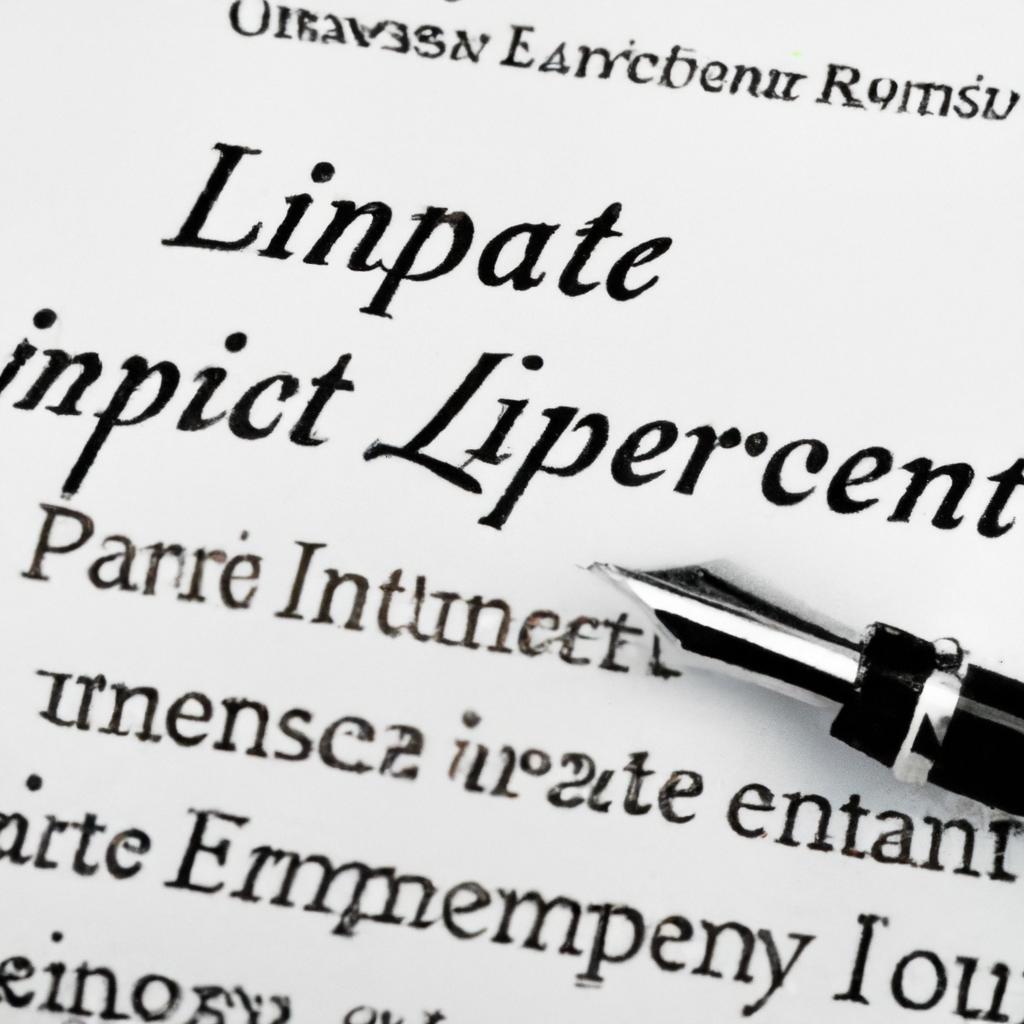In the intricate tapestry of estate planning, the threads of life insurance and probate are woven together to form a crucial safeguard for one’s financial legacy. At Morgan Legal Group, nestled in the bustling metropolis of New York City, we specialize in navigating the complex landscape of Wills, trusts, and elder law. Join us as we delve into the intersection of life insurance and probate, unraveling the mysteries and shedding light on the indispensable role they play in securing the future for you and your loved ones.
Understanding the Role of Life Insurance in Probate Proceedings
Life Insurance and Probate
Life insurance plays a crucial role in probate proceedings, often serving as a valuable asset that can help beneficiaries cover financial obligations and estate taxes. When an individual passes away, their life insurance policy is typically included in their estate and becomes subject to the probate process. It is essential for individuals to understand how life insurance intersects with probate laws to ensure a smooth distribution of assets to their intended beneficiaries.
It is important to note that life insurance policies with designated beneficiaries, such as spouses, children, or trusts, typically bypass probate proceedings and are paid directly to the beneficiaries. However, in cases where the policyholder fails to designate a beneficiary or the named beneficiary is deceased, the life insurance policy may become part of the probate estate. As experienced estate planning attorneys, we recommend reviewing your life insurance policies regularly and updating beneficiaries as needed to avoid complications during the probate process.

Strategies for Minimizing Probate Issues With Life Insurance
When it comes to minimizing probate issues with life insurance, there are several strategies that can be implemented to ensure a smooth process for your loved ones. One key strategy is to designate a specific beneficiary for your life insurance policy. By naming a beneficiary, the proceeds of the policy can bypass probate and be paid directly to the beneficiary, avoiding the lengthy and costly probate process. Additionally, regularly reviewing and updating your beneficiary designations is crucial to ensuring that your wishes are accurately reflected.
Another effective strategy is to consider establishing a revocable living trust to hold your life insurance policies. By transferring ownership of the policies to a trust, these assets can also bypass probate and be distributed according to your wishes without the need for court intervention. This can provide added privacy and control over the distribution of your assets. Consulting with an experienced estate planning attorney, such as the attorneys at Morgan Legal Group in New York City, can help you develop a comprehensive plan to minimize probate issues with your life insurance policies.

Ensuring Proper Beneficiary Designations to Streamline Probate Process
When it comes to ensuring proper beneficiary designations to streamline the probate process, one key aspect to consider is how life insurance policies fit into the overall estate plan. Life insurance policies are an important financial tool that can provide for loved ones in the event of the policyholder’s passing. However, if the beneficiary designations on these policies are not up to date or properly executed, it can lead to complications during the probate process.
Properly designating beneficiaries on life insurance policies is crucial to ensure that the policy proceeds are distributed according to the policyholder’s wishes and to avoid potential delays in the probate process. By taking the time to review and update beneficiary designations, individuals can streamline the distribution of assets and provide clarity for their loved ones during what can be a difficult time. Working with an experienced estate planning attorney can help navigate the complexities of beneficiary designations and ensure that your wishes are carried out efficiently.

Importance of Regularly Reviewing Life Insurance Policies in Estate Planning
When it comes to estate planning, regularly reviewing life insurance policies is crucial to ensure that your loved ones are protected in the event of your passing. Life insurance can play a significant role in providing financial security for your family after you are gone. By assessing your life insurance policies regularly, you can make necessary adjustments to ensure that your coverage aligns with your current financial situation and the needs of your beneficiaries.
It is important to review your life insurance policies in the context of estate planning because the proceeds from your policy may be subject to probate. Without proper planning, your loved ones may face delays and additional costs during the probate process. By staying proactive and updating your life insurance policies as needed, you can help streamline the distribution of assets to your beneficiaries and minimize the impact of probate on your estate.
Q&A
Q: What is probate and how does it relate to life insurance?
A: Probate is the legal process of proving a will and distributing a deceased person’s assets. Life insurance policies typically bypass probate, as the proceeds are paid directly to the designated beneficiaries.
Q: Can life insurance be included in the probate process?
A: If a beneficiary is not designated or if the estate is named as the beneficiary, the life insurance policy may become part of the probate process.
Q: How can proper estate planning help avoid probate issues with life insurance?
A: By designating specific beneficiaries on your life insurance policy and updating them as needed, you can ensure that the policy proceeds are not subject to probate.
Q: What are the potential drawbacks of life insurance going through probate?
A: Probate can be a lengthy and costly process, potentially delaying the distribution of life insurance proceeds to your loved ones.
Q: Are there any strategies for minimizing probate issues with life insurance?
A: Setting up a trust and naming it as the beneficiary of your life insurance policy can help avoid probate and provide additional benefits such as control over how the proceeds are distributed.
The Way Forward
In conclusion, understanding the relationship between life insurance and probate can help ensure that your loved ones are taken care of and your assets are distributed according to your wishes. By carefully planning ahead and considering the implications of probate on your life insurance policy, you can protect your estate and provide for your beneficiaries in the most efficient way possible. Remember, seeking guidance from financial and legal professionals can help ease the process and give you peace of mind knowing that your legacy is secure. Thank you for reading.
 Life Insurance and Probate: What You Need to Know
Life Insurance and Probate: What You Need to Know
When it comes to planning for the future, two essential aspects that individuals often overlook are life insurance and probate. While both are important to consider and understand, many people confuse the two or assume that one negates the need for the other. In reality, these two elements work together to ensure that your assets and loved ones are protected in the event of your passing.
In this comprehensive article, we will discuss what life insurance and probate are, their roles and importance, and how they can complement each other in your overall estate planning. We will also delve into the benefits and practical tips of incorporating both into your financial preparedness and share relevant case studies and first-hand experiences to provide a well-rounded perspective on the topic.
Understanding Life Insurance
Life insurance is a contract between an insurance company and an individual, where the insurer promises to pay a designated beneficiary a sum of money, also known as the death benefit, upon the insured’s death. The agreement is based on the payment of a premium, which can be made in a lump sum or regular payments over time.
There are several types of life insurance, with the two most common being term life and whole life insurance. Term life insurance provides coverage for a specific period, typically 10-30 years, while whole life insurance covers the individual for their entire life as long as premiums are consistently paid.
The Benefits of Life Insurance
The primary benefit of life insurance is to provide financial security to your loved ones in the event of your untimely passing. The death benefit can help cover day-to-day expenses, mortgage payments, funeral costs, and even your children’s education expenses. Additionally, if you have a family business, life insurance can help ensure its continuity and provide income for your loved ones to maintain their standard of living.
Moreover, life insurance also serves as a tax-free investment and can be used to pay any outstanding debts or estate taxes. It can also contribute to building generational wealth by offering a source of inheritance for your beneficiaries.
Practical Tips for Purchasing Life Insurance
1. Assess Your Needs: Start by evaluating your financial goals and responsibilities. Consider factors such as your age, marital status, children, assets, and debts. This assessment will help you determine the type and amount of coverage you require.
2. Understand the Different Types of Life Insurance: As mentioned earlier, term life and whole life insurance are the most common types of coverage. While term life is more affordable, it only provides temporary coverage, whereas whole life insurance offers lifelong coverage but has higher premiums.
3. Seek Professional Advice: It is always advisable to consult a financial advisor or insurance agent when considering life insurance. They can assess your financial situation, recommend the right type of coverage, and guide you through the application process.
Understanding Probate
Probate is the legal process of administering a deceased person’s estate, including their assets and debts. It involves proving the validity of the will, determining the assets, paying off any outstanding debts, and distributing the remaining assets to the rightful beneficiaries.
If a person dies without a will, also known as intestate, the probate court will appoint an executor to divide the assets according to state law. If the deceased has a will, the executor named in the will is responsible for carrying out the probate process.
The Importance of Probate
Probate ensures that a deceased person’s assets are distributed according to their wishes and state laws. It also protects the interests of creditors and beneficiaries, providing a fair and transparent distribution process. Probate also serves as a final chance to address any outstanding debts and make sure that all obligations are resolved before the remaining assets are distributed.
Benefits of Incorporating Life Insurance and Probate in Your Estate Planning
While life insurance and probate may seem like opposing elements in estate planning, they can work together to provide comprehensive protection for your assets and loved ones. Here are some benefits of incorporating both in your planning:
1. Cost-Efficiency: While probate can be an expensive and time-consuming process, the death benefit from life insurance can help cover any incurred costs, relieving your loved ones of any financial burden.
2. Flexibility: The death benefit from life insurance is not subject to probate, meaning that it can be paid out to your beneficiaries quickly and without any added legal fees.
3. Avoiding Estate Tax: Life insurance proceeds are usually not subject to income tax, making it a tax-efficient way to transfer wealth to your beneficiaries. Additionally, if you set up an irrevocable life insurance trust, the death benefit can also be excluded from the estate tax.
Real-Life Case Studies
1. The Nelson Family: John and Mary had two young children and a mortgage on their first family home. John unexpectedly passed away, leaving Mary with the mortgage and other expenses. However, John had a life insurance policy, which covered the mortgage and provided financial security for his family as they adjusted to their new reality.
2. The Scott Family: Howard was a successful entrepreneur with significant assets but had not done any estate planning. When he passed away without a will, his assets went into probate and were subject to creditors and state laws. His family ended up with a fraction of their inheritance.
First-Hand Experience
I recently lost my grandmother, and because she had life insurance and a well-prepared will, the probate process was smooth and efficient. The life insurance policy covered her burial expenses, and the remaining assets were divided according to her wishes and state laws, providing peace of mind to our family during a difficult time.
In conclusion, life insurance and probate are two essential elements of estate planning that complement each other and provide comprehensive protection for your assets and loved ones. Understanding the benefits and incorporating both in your financial preparedness can have long-lasting benefits for your beneficiaries and create generational wealth for your family. As always, consult financial and legal experts to ensure that your planning aligns with your goals and best interests.


